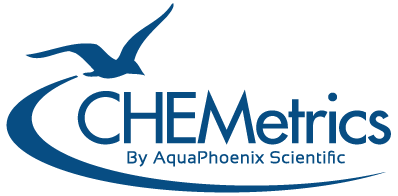Hardness Test Kits

What is Hardness?
Hardness is a measure of the mineral content of water. Calcium and magnesium are the most common minerals that contribute to hardness of water. The greater the concentration of dissolved minerals, the “harder” the water.
Why test for Hardness?
Testing water hardness is standard for quality assurance across many industries. Hard water is the cause of many issues both cosmetic, (nuisance), and critical. Hard water can leave unsightly residue on surfaces, even after cleaning with soap or detergent. When heated, hard water leaves mineral deposits which can clog pipes and damage equipment over time making it a particular concern to boiler and power generating industries. Although water hardness does not pose a health concern, high levels will impact the taste of drinking water, so it is commonly measured in communities who use groundwater wells as their primary water source.
About our Test Kits
These hard water test kits utilize CHEMetrics Titrets® ampoules. Titrets ampoules use a reverse titration technique to measure analyte concentration levels (titrant volume inside the ampoule is fixed while the sample volume is varied). After snapping the ampoule tip, sample is drawn into the test ampoule in small doses until a color change signals the endpoint has been reached. The titration is stopped at the end point, and the liquid level in the ampoule corresponds to the concentration printed on a scale on the ampoule’s outer surface. We offer two different chemistries for analysis in our hard water test kits: the EGTA (for calcium hardness) and the EDTA method (for total hardness). Read more about each at the bottom of the page.
Click on a catalog number in the tables below for more information or to purchase a hard water test kit.
Visual Kits
| Range | MDL | Method | Kit Catalog No. | Refill Catalog No. |
|---|---|---|---|---|
| 50-500 ppm as CaCO3 | 50 ppm | EGTA (calcium) | K-1705 | |
| 2-20 ppm as CaCO3 | 2.0 ppm | EDTA (total) | K-4502 | |
| 20-200 ppm as CaCO3 | 20 ppm | EDTA (total) | K-4520 | |
| 100-1000 ppm as CaCO3 | 100 ppm | EDTA (total) | K-4585 |
Methods
Reference: West, T. S., DSC, Ph.D., Complexometry with EDTA and Related Reagents, 3rd. ed., pp. 46, 164 (1969). The EGTA method is specifically for the calcium test kit. The EGTA titrant in alkaline solution is employed with a zincon indicator. Results are expressed as ppm (mg/L) CaCO3.Shelf-life: eight months. Although the reagent itself is stable, the end point indicator has a limited shelf-life. We recommend stocking quantities that will be used within seven months.
References: APHA Standard Methods, 23rd ed., Method 2340 C- 1997. USEPA Methods for Chemical Analysis of Water and Wastes, Method 130.2 (1983). The total hard water test kits are applicable to drinking, surface, boiler, and brine waters. The EDTA titrant is employed in alkaline solution with a calmagite indicator. This method determines the combined calcium and magnesium concentration of a sample. If no magnesium is present, the end point of the titration normally appears sluggish. Results are expressed as ppm (mg/L) CaCO3.

